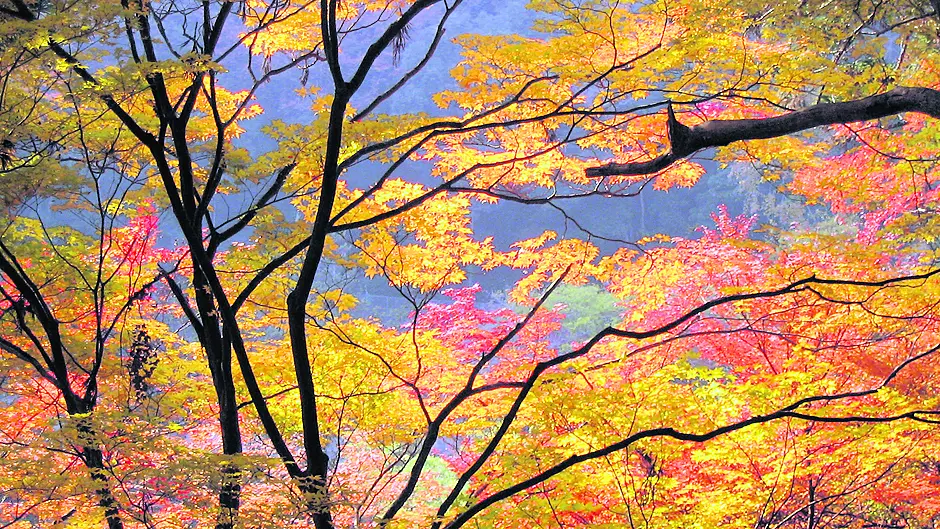Wildlife with an amateur observer
SUDDENLY there are leaves everywhere – flying into the porch every time the door opens, the slippery- underfoot variety in wet grass, and those that go rogue by blocking the drains.
Most of our broadleaved trees in Ireland are deciduous and they are shedding their leaves now as the days shorten and the temperature cools.
There are many reasons that trees discard their leaves annually in this way, and they also benefit our soil and insect life, and therefore our entire ecosystem.
The autumn leaves …
Leaves are vital to a tree as a way of producing food which it uses to live and grow.
They contain a green pigment, called chlorophyll, which absorbs light energy from the sun. This energy is then turned into food by the leaves in a process called photosynthesis, absorbing carbon dioxide to transform it into carbohydrates to feed the tree.
Before leaves are shed by the tree, their colour changes to the familiar warm tones of autumn.
These colours reflect the accumulation of waste products from the rest of the tree, alongside its reabsorption of chlorophyll to be reused the following spring.
Once its use is exhausted, a waterproof cork layer forms at the base of each leaf stalk, which cuts the leaf off from the tree.
This joint is weakened and the leaves are either blown off, or fall off after a frost which further ruptures the joint.
As the foliage turns red and gold, the tree drains most of the nutrients from the leaves to store in the roots and trunk to tide it over winter.
In spring, this stored energy rises in the sap to fuel the intensive growth activity before the new leaves can produce enough food by photosynthesis.
Why do it?
It seems such a waste discarding thousands of leaves every autumn which have to be regenerated the following spring. But it seems that it has a purpose in nature.
Conifers have been on this planet for around 170 million years but deciduous trees only started to develop around 100 million years ago.
So shedding foliage in wintertime is a step forward in evolutionary terms.
Why do it? Shedding their leaves allows deciduous trees to excrete waste. And hibernation allows the tree to recover its energy for the following year.
Like humans, trees suffer from sleep deprivation – deciduous trees grown in containers indoors do not flourish because they are not allowed to ‘rest’ in this way.
Storage of energy is another factor. In autumn, deciduous trees start to fill their tissues with sugar made with energy from the sun.
Unlike animals, trees cannot get fatter as their external woody surface does not expand so there is a point when the tree becomes ‘full’.
And, for some species of trees, this can happen as early as July.
Another good reason is water content. Evaporation causes leaves to need a constant supply of water which is pumped up from the roots in summer.
However, in wintertime, roots cannot absorb enough water to supply the needs of the foliage because cold soil makes the roots less efficient. And, because ice cannot be absorbed at all, if a tree freezes while its wood is too wet it would burst like a frozen water pipe.
So, to avoid this danger, trees start to cut back on activity and water content from late summer onwards.
And lastly, shedding leaves makes a tree more aerodynamic, which is highly important during the winter storm season.
A bad storm can pummel a mature trunk with a force equivalent to a weight of around 220 tonnes.
By casting off its leaves, a deciduous tree loses a surface area of over a thousand square yards. And by so doing, reduces the wind resistance of its total profile to around that of a modern car.
Leaves are recycled in a myriad ways, benefiting our entire ecosystem by supporting vital flora and insect life.
Brought into the deep earth by earthworms, the nutrients from leaves enrich our depleted soil to sustain our land. Leaves are even beneficial for our seas.
As they fall into rivers and streams, leaves leach acids into the ocean which stimulate the growth of plankton, the vital building-block of so much of our marine life.
So I’ll try not to complain about a bit of drain clearance and extra cleaning at this time of the year and, instead, enjoy the magical experience of crunching leaves underfoot.








